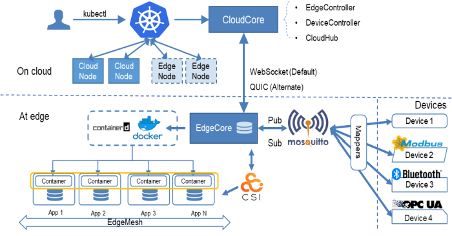1. Background
By incorporating multiple emerging technologies, including Internet of Things (IoT), 5G, Cloud computing and Artificial Intelligence (AI), industrial 4.0 enhances the efficiency of the entire manufacturing and operational process. Traditional cloud-based approaches require the data to be centralized in a cloud server or data center. However, this results in critical issues related to unacceptable latency and communication inefficiency. To this end, Mobile Edge Computing (MEC) has been proposed to bring intelligence closer to the edge, where data is produced.
The demand for smartness in embedded systems has been mounting up drastically in the past few years. Embedded systems today must address the fundamental challenges introduced by cloud computing and artificial intelligence. KubeEdge [1] is an edge computing framework built on top of Kubernetes [2]. It provides compute resource management, deployment, runtime and operation capabilities on geo-located edge computing resources, from the cloud, which is a natural fit for embedded systems.
2. Thesis scope
This thesis aims to build a heterogeneous cloud native testbed for remotely developing and experimenting artificial internet of things (AIoT) applications. The testbed is built based on KubeEdge [1], as shown below:

The draft for this testbed is as follows:

The tasks for this thesis:
1. Learn about the KubeEdge platforms;
2. Learn about different hardware devices such as ESP32, Arduino, Raspberry pi, Nvidia Jetson Nano, etc;
3. Established a testbed for above hardwares and software;
4. Develop a web IDE front-end;
5. Run a simple AIoT application on the testbed.
3. Required student background
Interested in Embedded System, Distributed System and Cloud Native Technologies;
Background in tools such as Linux, Raspberry Pi, Containers;
Good coding skills, such as Python.
[1] https://kubeedge.io/en/
[2] https://kubernetes.io/